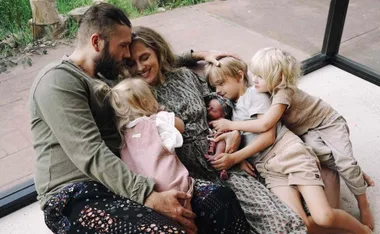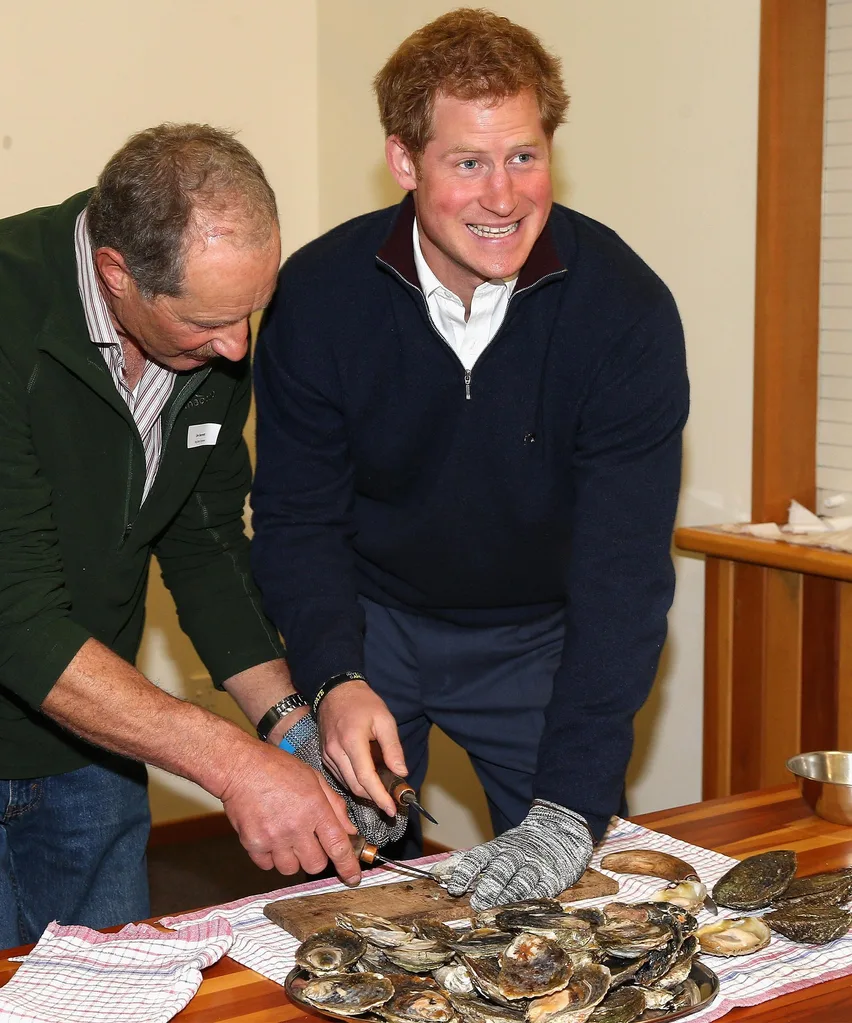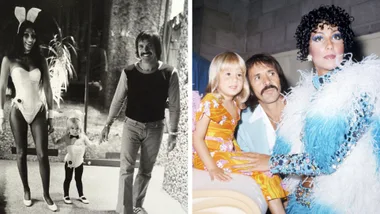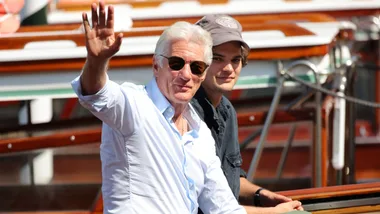On the evening of their wedding, Rupert Murdoch and Jerry Hall flew by private jet to the south of France and headed for Saint-Paul de Vence, an ancient hill village, which, when you’re an 85-year-old bridegroom, can come as something of a shock.
The narrow, cobbled streets are as steep as the local prices, and as Deputy Mayor Nadine Gastaud explains, “Everyone has to walk. We banned cars in the 14th century”.
If Rupert was looking faintly distraught by the time he and Jerry had puffed their way to the sun-dappled summit, it was perhaps because the significance of their honeymoon destination had started to dawn on him.
Saint-Paul is a Jerry haunt from the hedonistic heyday of The Rolling Stones era. The band first arrived in the area in the ’70s to work on their classic Exile On Main Street album. Bill Wyman, the Stones’ ex-bass player, a guest at the wedding, still has a house nearby, and Mick Jagger, Jerry’s ex-husband, and his co-frontman, Keith Richards, are long-time regulars at the celebrated La Colombe d’Or restaurant.
That Jerry chose a honeymoon destination so steeped in past associations – and that Rupert went along with it – offers an intriguing insight into the dynamics of their new marriage.
Ever since she definitively split from Jagger 17 years ago, Jerry, a stalwart of the British celebrity interview circuit, has been insisting that she had no need for another man in her life.
“I’ve got four children and that’s enough,” she told me a few years ago, “and I’ve got my own money and I’m still working, and I don’t need anyone telling me what to do.”
Occasionally – as is Jerry’s way – she would say the exact opposite, bemoaning the unfortunate plight of women left to grow old alone.
So it has always been hard to know what Jerry is really thinking. As Lynn Barber, an eminent British interviewer, says, “Any time I quoted anything from one of her previous interviews, she denied having said it.”
Well, that’s one way to keep your life story fresh. And Jerry has quite a life story. Raised in a dreary Texas town, the daughter of an alcoholic truck driver, she became a teenage model, reigned over the catwalks of Paris and Milan, married and divorced the world’s most libidinous rock star, and now, at the age of 59, has landed its most powerful media tycoon.
When news of her romance with Rupert broke, the general view was that Jerry must have made the running. She awoke to a barrage of unchivalrous headlines, along the lines of, “So what first attracted you to your billionaire boyfriend, Miss Hall?”
To many who have followed Jerry’s remarkable career, it seemed obvious that becoming Mrs Murdoch was merely the latest of her many re-inventions. The truth, though, may be different.
Rupert, the product of a famously close and successful marriage, has never even pretended to enjoy being single. Michael Wolff, author of a recent biography of the tycoon, describes him as a man whose need for companionship and emotional security completely contradicts the ruthless, uncompromising approach he brings to business.
His four marriages, dating back to 1956, have run more or less seamlessly, with the only significant gap being the three years between his 2013 divorce from wife No. 3, Wendi Deng, and his March marriage to Jerry.
Wolff points to Rupert’s daughter Elisabeth’s view that her father is easily dominated by women, describing him as a “conventionally henpecked husband” whose main matrimonial priority is to avoid conflict.
His wives have shaped his character, his life and, to some extent, his career, in ways that even Rupert doesn’t fully realise. At the same time, says Wolff, he is a man of real passion, “who has known the deepest hell of repressed desire”.
It is tempting to say that this is a male condition familiar to Jerry. Except that Jagger didn’t bother to repress it. In the end, his prodigious infidelities broke them up, although they remain on good terms. “Mick is a wonderful person,” Jerry says. “He slept with lots of other people, which was horrible. Otherwise, he was perfect.”
In fact, Jerry has been remarkably forgiving of all the significant men in her life, including Bryan Ferry, the Roxy Music singer, even though he hasn’t spoken to her since she broke off their engagement almost 40 years ago.
And Warwick Hemsley, a dapper Australian property tycoon whom she fell for while appearing as Mrs Robinson in a stage production of The Graduate. They parted – apparently over his reluctance to settle in London – after a two-year relationship. “He is a lovely man, I had the most wonderful time,” she declared.
It isn’t as though Jerry doesn’t have the ammo. Mick Jagger and Bryan Ferry were both vain, tactless and, shall we say, careful with the cash. So careful that Mick allegedly tried to reduce the size of her divorce payment by claiming that they had never been properly married, while Bryan, according to Jerry, once didn’t call her for a month while he was on a tour of the Far East “because he said it was too expensive”.
Immediately after her wedding to Rupert it was reported that Mick, 72, was trying to evict Jerry from the magnificent London home they once shared, on the grounds that her settlement only allowed her to stay there until she remarried. The story was untrue, although I understand ownership of the place will now be made over to the Jagger children.
Not that Jerry should have any accommodation worries. Rupert’s portfolio of properties includes homes in California, New York, the Rocky Mountains, London and Melbourne. The big question is not where the newlyweds will live, but how.
And with what unforeseeable consequences?
Attached as he is to the concept of marriage, it would be hard to argue that Rupert has been a good husband. His first wife, Patricia Booker, a Melbourne airline stewardess, weathered disapproval from the Murdoch clan, only to be abandoned 11 years later for Anna Torv, a young Sydney journalist.
Their marriage lasted over 30 years and seemed destined to go the distance – until Anna began lobbying Rupert to retire. No greater heresy is imaginable in the mind of a man who declared only half-jokingly after being cleared of prostate cancer, “I believe I am immortal”.
Instead of slowing down, Rupert convinced himself that he needed an even faster lifestyle. One without the encumbrance of the sensible, down-to-earth Anna. “I thought we had a wonderfully happy marriage,” she mused later. “Obviously, I was wrong.”
Enter Wendi Deng, a one-time waitress in a Los Angeles noodle parlour, with what Vogue described
as “the kind of looks usually reserved for a James Bond villainess”.
The suspicions that surround Rupert’s dealings settled on the theory he married her to advance his Chinese business interests. Yet they had two daughters and for some time the relationship seemed to invigorate him. Well before they separated in 2013, though, Rupert was complaining he was lonely and depressed, and on the pretext that she had become too close to former British Prime Minister Tony Blair, Wendi was shuffled out of his life.
Any Murdoch marriage has dynastic implications and Jerry has arrived at a particularly awkward time. Tensions within Rupert’s family have barely eased since the British phone-hacking scandal five years ago almost brought down his entire empire.
The fall-out exposed serious rifts between his sons, Lachlan, 44, and James, 43 – the two main candidates for the eventual succession – and their smart, influential sister, Elisabeth, 47.
“The big issue in the whole Murdoch cosmos is where Rupert goes from here,” says one of Murdoch’s former London editors with close ties to the company. “No one seriously imagines he’s going to retire, but there’s a kind of polite impatience at his reluctance to concede more power. If Jerry Hall can help nudge Rupert into a quieter life, I think certain people will be very grateful. If she perks him up, so to speak, there’s going to be trouble.”
She will certainly bring a new edge to Rupert’s life. There’s an endearingly old-fashioned streak in Jerry that comes from her small-town American upbringing and which, one suspects, has never sat comfortably with the whole louche, rock star world she rather improbably ended up in. She was raised, one of five sisters, in a pink bungalow in Mesquite, Texas, a down-on-its-luck town best known for rodeo and barbecue joints.
Jerry’s mother, Marjorie, was obsessed with Gone With The Wind, the Clark Gable and Vivien Leigh movie epic of the Old South, which she watched endlessly, and her daughters were, as Jerry put it, “raised girlie”, in a semi-fantastical world of whispering white ballgowns and rock-jawed beaux.
Their father, John, by contrast, appeared to come straight out of a roadhouse blues album – a truck driver who drank and then dosed on uppers to keep himself awake. “He’d beat us up,” Jerry once said. “Sometimes he used to beat us with a belt so bad that we’d have black and blue welts on our legs and couldn’t go to school. But we never felt we were abused. In our town, lots of kids were beat up.”
She never felt beautiful either and, after school, took a short-lived job at an ice-cream parlour. Things took an unexpected turn for the better when, after being injured in a car accident, she received $800 in compensation and decided to spend it on a trip to Paris. She was a tall, 16-year-old blonde, glowing with Texan wholesomeness, and once she had landed a temporary job in a cabaret revue, it was only a matter of time before a model agency scout spotted her.
She met the glossily coiffured Bryan Ferry when she posed in a mermaid’s costume for the cover of Roxy Music’s album Siren, but swiftly and fatefully moved on to Mick, a man who seemed to think monogamy was something you made dining tables out of.
While the rock world wasn’t really hers – she says she never took drugs and hated touring – she was grateful for the privileged life it gave her and her loyalty to Mick is no act.
Eight years ago, she agreed to write her autobiography for an advance fee of almost $1 million, but when the publishers demanded she dish more dirt on Jagger, she sent the money back.
Jerry says she is happiest at home with her children and particularly in the garden, where she keeps chickens and grows her own organic vegetables.
“I suppose I’m very English now,” she once told me. “It’s home. I couldn’t imagine living anywhere else.”
Shortly afterwards, she told another publication, “The weather in Britain sucks. I wouldn’t choose to live in England really, but my kids are English so I’m stuck here.”
Unlike the fretful younger Murdochs, Jerry’s children – models Elizabeth, 32, and Georgia May, 24, actor James, 30, and aspiring artist Gabriel, 18, are said to be “relaxed and happy” about the prospect of having Rupert Murdoch as their stepdad.
Once the dizziness of their romance wears off, the newlyweds, who only began dating last October, will face the task of really getting to know each other.
Can they make it work? Author William Shawcross, a long-time confidant of Rupert’s, is convinced that the omens are good, saying, “He’s very happy, he’s completely in love”, while Jerry says her new husband is “completely wonderful”.
According to another Murdoch associate, “what Rupert’s really been looking for all these years is not so much a wife as a First Lady. Someone who will run his life in private and be at his side in public. I have a feeling Jerry might be quite good at it.”
The choice of honeymoon destination came as an early pointer to what kind of marriage this might be. Not only does Rupert have a dim opinion of France – seeing it as a den of socialists and bureaucrats – but he had hoped to spend the time cruising on his 70-metre super-yacht, Vertigo.
By the time they had scaled the high hill with its spectacular views over Provence, he possibly had altitude sickness anyway. In the meantime, Jerry would do well to keep her feet firmly on the ground.
This story originally appeared in the May 2015 issue of The Australian Women’s Weekly.
Newsletter conversion description. Get the latest in your inbox.














































.png?resize=380%2C285)
.jpg?resize=380%2C285)


















